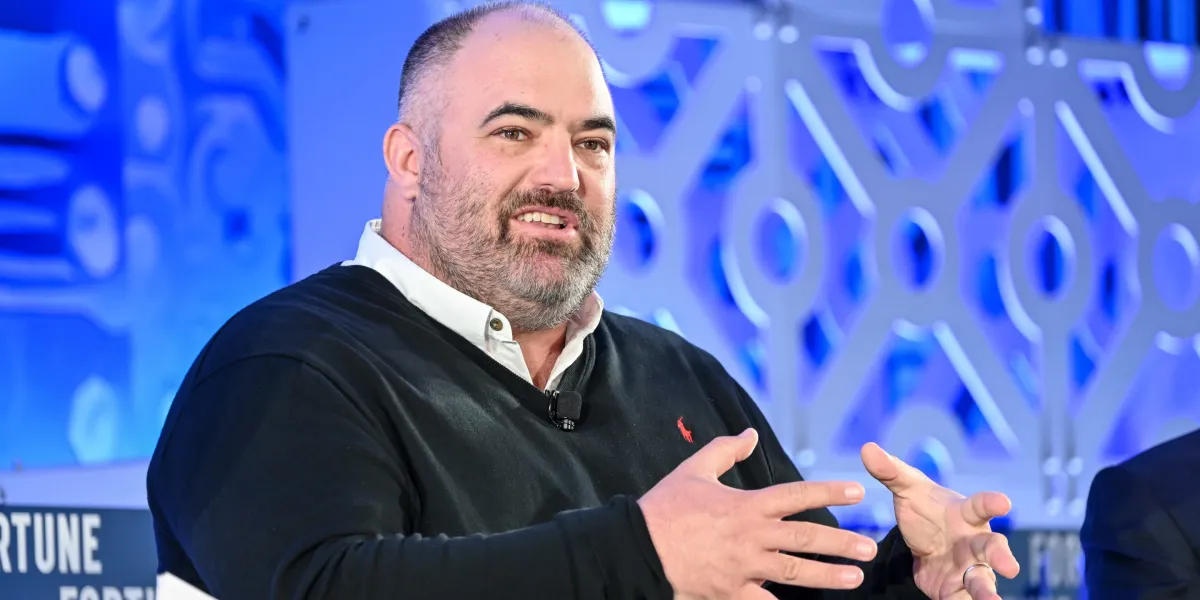Cybersecurity in health care ‘truly takes a village’

Good morning. Cybersecurity is top of mind in many C-suites and audit committees, but cyberattacks in the health care sector, in particular, are on the rise, experts say.
“In my world, it’s almost an act of war,” Stephen Gillett, chair and CEO of life science company Verily, said during Fortune’s Brainstorm Health conference in Dana Point, Calif., earlier this week. “Those are people’s lives, their personal information. That is not something that should just be a tech issue that we’re solving for.”
For example, Change Healthcare, a division of UnitedHealth Group, was affected by a ransomware attack on Feb. 21 targeting billing and care authorization portals. It caused a nationwide outage of the network, with some providers initially losing an estimated $100 million per day. It’s estimated that a third of Americans had their health information leaked to the dark web.
“I think cybersecurity in health care truly takes a village,” said Andrea Downing, president and cofounder of The Light Collective. “We can no longer assume that what happens within our firewalls is going to be good enough.” Many hackers are outpacing existing protections, Downing added, saying her organization is even starting to see ransomware attackers impersonate physicians and infiltrate clinical research.
“Within health care cybersecurity, we have [Health-ISAC] and [Bio-ISAC],” Downing said. “We have to expand capacity beyond just one health care system, sharing intel with one another. To really build resistance, we’re going to have to shore up the public-private partnerships and fund an infrastructure to really get ahead, and detect and respond to these attacks.”
Finance chiefs of hospitals and health care systems are focused on building loyalty among patients and using advanced tech to enhance the customer experience. Few things, if any, can destroy customer loyalty faster than a well-targeted cyberattack.
You can watch a video of the complete panel session at Brainstorm Health here.
In recognition of the Memorial Day holiday, the next CFO Daily will be in your inbox on Tuesday. Have a good weekend.
Sheryl Estrada
sheryl.estrada@fortune.com
Leaderboard
Some notable moves:
Paul Vogel was named CFO at VF Corporation (NYSE: VFC), a branded lifestyle apparel, footwear and accessories company, effective July 8. He will succeed Matt Puckett, who, as previously announced, will be stepping down. Vogel most recently served as CFO of Spotify Technology S.A. from January 2020 to December 2023. During his tenure as CFO, Spotify transformed into an EBIT profitable business and expanded to 180 markets from 80 markets. Before serving as CFO, he was Spotify’s head of financial planning and analysis and treasury and investor relations.
Peter Knag was named CFO at Offerpad Solutions Inc. (NYSE: OPAD), a tech-enabled platform for residential real estate, effective June 5. Knag is the former EVP and CFO for Turner Broadcasting System, Inc., the parent company of CNN, TNT, and TBS. Before that, he was EVP of WarnerMedia Finance. Prior to his tenure at Turner, Knag held key leadership roles at AT&T Inc.
Krishna Rao was named the first CFO of Anthropic, an AI startup. Rao joins the company from Fanatics Commerce, a digital sports platform, where he served as CFO. As finance chief at Cedar, a health care payments and patient engagement platform, he led both the finance function and operational initiatives. Before that, Rao was an executive at Airbnb, serving as global head of corporate and business development and leading corporate and operations FP&A. Earlier in his career, he spent time as a private equity investor at Blackstone and as a strategy consultant at Bain & Company.
Deborah Knobelman was named COO and CFO at Kronos Bio, Inc. (Nasdaq: KRON), effective June 3. Knobelman was previously CFO and head of corporate development for Senti Bio. Knobelman took the company public in 2022. Prior to Senti, she served in interim C-suite roles for several life sciences companies, including Jogo Health, Thinklabs, and Aktiv Pharma Group, and served as CFO at GeneriCo, LLC and chief business officer at Ampio Pharmaceuticals, Inc.
Jamie G. Pierson was named interim CFO at Forward Air Corporation (Nasdaq: FWRD), effective May 20. Pierson succeeds Rebecca Garbrick, who is departing the company. Garbrick, CFO since 2020, will remain for a transition period. Pierson most recently served as CFO of MV Transportation. Before that, he held various senior leadership positions, including EVP and CFO of Ecobat Technologies and YRC Worldwide, Inc. Forward has initiated a search for a CFO with the assistance of an executive search firm.
Daniel Tempesta, CFO at Cerence Inc. (Nasdaq: CRNC), an AI company, has stepped down from his position for personal reasons, effective May 17, according to a regulatory filing. Tempesta began in the role on March 18. The board of directors has designated Stefan Ortmanns, president and CEO, as the company’s principal financial officer, and Katherine Roman, VP and corporate controller, as the company’s principal accounting officer, each on an interim basis. The company has initiated a search for a permanent CFO.
Big Deal
A new S&P Global Market Intelligence report finds that in Q1, the top 35 venture capital firms announced 51 artificial intelligence funding rounds, up from 31 at the same time last year. AI represented a larger share of firms’ total investments, increasing to one out of every five in early 2024 compared to one out of every 10 in early 2023, according to the report.
Going deeper
Here are a few Fortune weekend reads:
“Nvidia CEO Jensen Huang doesn’t wear a watch. Here’s why” by Chloe Berger
“Inflation may be cooling, but most Americans are still feeling squeezed by ‘cost of living creep’” by Alicia Adamczyk
“Walmart and Target earnings pull back the curtain on an America struggling with high inflation” by Will Daniel
“3 ways to nurture your employees’ mental well-being: ‘It builds that trust in them that you have their back’” by Lindsey Leake
Overheard
“There is something endemic inside of OpenAI that is coming to the surface through one significant issue after another. There’s this culture that has risen up out of super-hyper-growth, out of being the most important company in one of the biggest trends in history, and now there are little signs of stress fractures.”
—Daniel Newman, principal analyst at the Futurum Group, told Fortune.



